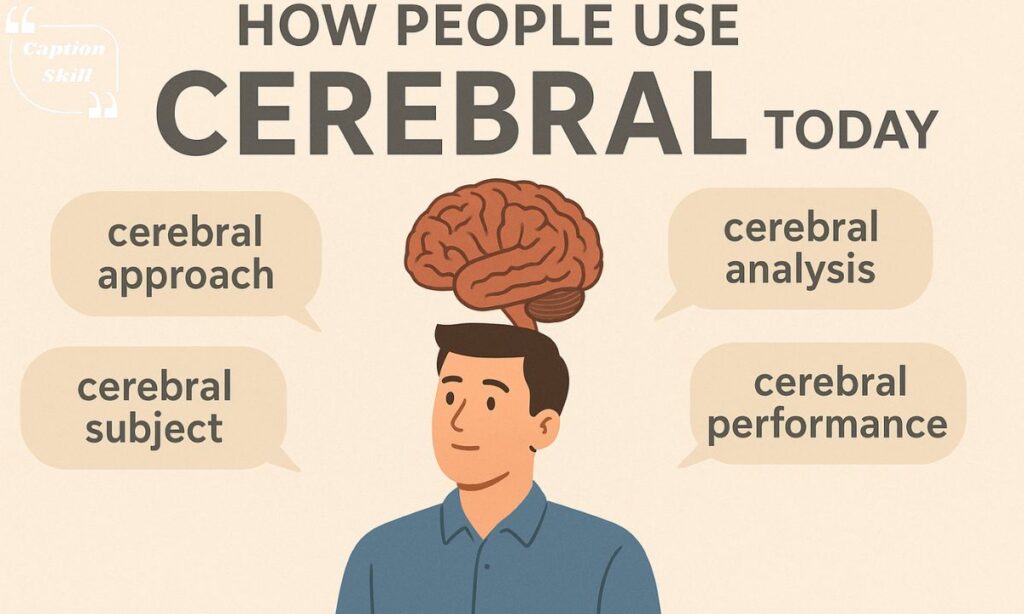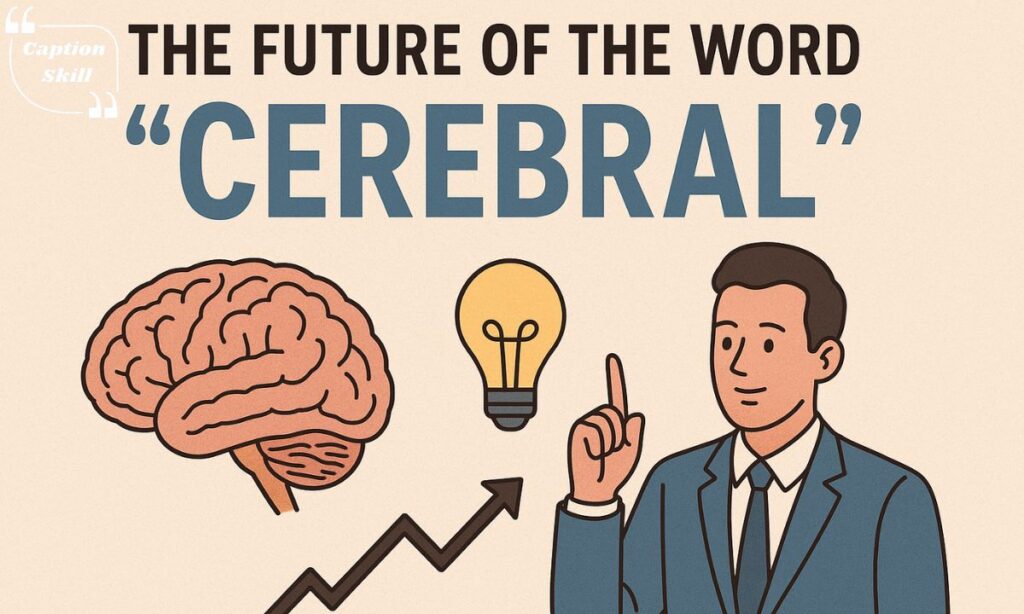Language often shapes how we see intelligence and thought. One word that consistently conveys depth and intellect is “cerebral.” It’s more than just a scientific term — it reflects how we think, analyze, and process ideas in both professional and everyday settings. Whether found in academic journals, medical discussions, or creative critiques, “cerebral” holds a unique place in the vocabulary of both science and art.
This guide explores its definition, history, correct pronunciation, real-world uses, related vocabulary, cultural relevance, and why it matters in communication today.
What Does “Cerebral” Mean?
At its core, cerebral is an adjective linked to the brain or intellectual processes. In technical or scientific contexts, it describes anything connected to brain anatomy or function. In everyday speech, it often refers to thought-provoking activities or people who rely heavily on reasoning and analysis.
For example, someone who prefers strategy-based games or philosophical debates over lighthearted chatter might be described as having a cerebral nature. In media reviews, calling a film “cerebral” usually means it demands focus and deep thinking from the audience.
The Origin and Evolution of “Cerebral”
The word traces back to the Latin term “cerebrum” meaning “brain.” It entered English through medical and scientific language in the early 19th century, when precise anatomical terms became essential for research and education.
Initially, its use was mostly clinical — appearing in terms like cerebral cortex or cerebral blood flow. Over time, writers, critics, and educators adopted the word to describe intellectual or mentally stimulating concepts, broadening it far beyond the laboratory.
Is “Cerebral” a Slang, Acronym, or Name?
“Cerebral” is not slang, an acronym, or a trendy abbreviation — it’s a formal word rooted in academic and scientific vocabulary. While some casual uses exist in conversation or branding, its foundation remains formal.
Occasionally, companies in mental health, education, or technology use “Cerebral” as a brand name, drawing on its intellectual connotations. However, these are inspired uses rather than changes to the word’s core meaning.
“Cerebral” Pronunciation & Spelling
The spelling is straightforward: C-E-R-E-B-R-A-L.
Pronunciation varies slightly:
- American English: SERR-uh-bruhl (/ˈser.ə.brəl/)
- British English: suh-REE-bruhl (/səˈriː.brəl/)
How People Use “Cerebral” Today

The word appears across multiple fields:
- Medicine: Describing brain structures and conditions (e.g., cerebral hemorrhage).
- Education: Referring to learners who excel through logical analysis.
- Arts & Media: Used for films, books, or performances that stimulate deep thinking.
- Conversation: Applied to people who approach problems logically and thoughtfully.
- Branding: Adopted by businesses linked to mental performance or brain health.
Examples of “Cerebral” in a Sentence
- The novel’s plot was highly cerebral, requiring careful attention to detail.
- His problem-solving style is more cerebral than emotional.
- The documentary takes a cerebral approach to climate change.
- She enjoys cerebral challenges like advanced chess.
- The injury affected the cerebral hemisphere responsible for language.
Other Possible Meanings of “Cerebral”
While its main use connects to the brain, cerebral can shift in meaning based on context:
- Medical: Relating strictly to anatomy or medical conditions.
- Personality: Describing someone analytical, introspective, and logical.
- Cultural: Symbolizing intelligence or mental sophistication.
- Abstract: Used metaphorically to represent strategic or calculated thinking.
Words and Acronyms Related to “Cerebral”
- Cerebrum – Largest part of the brain.
- Cortex – Brain’s outer layer controlling advanced functions.
- Cognitive – Related to thought and learning.
- Neurological – Concerning the nervous system.
- Rational – Based on logic.
- Analytical – Skilled in detailed examination.
- Intellectual – Focused on reasoning and knowledge.
Is “Cerebral” in the Dictionary?
Yes. Major dictionaries like Oxford, Cambridge, and Merriam-Webster define it in two main ways:
- Related to the brain.
- Related to intellect or mental effort.
These references often provide examples and clarify both medical and figurative uses.
Better Alternatives to Say “Cerebral”
Depending on tone, you might choose:
- Intellectual – Strongly associated with deep thought.
- Thoughtful – Careful in reasoning.
- Analytical – Methodical and detailed in approach.
- Scholarly – Rooted in study and learning.
- Cognitive – Relating to thinking processes.
Cultural and Generational Impact of “Cerebral”
In past decades, being called cerebral sometimes carried a “bookish” or overly serious connotation. Today, it’s often viewed positively, linked to creativity, problem-solving, and wisdom.
Pop culture reflects this shift — with intellectual characters in shows like Sherlock or films like The Imitation Game gaining popularity and admiration. Younger generations increasingly see cerebral traits as both admirable and aspirational.
Why It’s Important to Know These Words
Expanding your vocabulary with words like cerebral sharpens communication skills. It helps you express nuanced ideas, understand advanced discussions, and navigate academic or professional contexts more confidently.
The Future of the Word “Cerebral”

With the rise of AI, neuroscience, and mental health awareness, cerebral will likely remain relevant. Future usage may expand into tech fields, describing brain-computer interfaces or advanced learning methods. As society values creativity and critical thinking more, the word’s positive connotation will grow.
Frequently Asked Questions
What does cerebral mean?
Relating to the brain or intellectual activity.
Is it a positive term?
Usually yes, especially when describing intelligence.
Can it be used casually?
Yes, but it’s more common in formal or descriptive contexts.
Is it only medical?
No, it’s used both medically and figuratively.
What’s a simple synonym?
Smart, thoughtful, or analytical.
Conclusion
The word cerebral holds a unique place in language because it effortlessly bridges science and intellect. It captures the essence of both the physical brain and the abstract realm of thought, making it useful in medicine, education, and creative expression. Its ability to adapt across different contexts has helped it remain relevant through changing times. Whether used in casual conversation or academic writing, it conveys depth and clarity.
In a world that increasingly values critical thinking and mental agility, cerebral stands as a symbol of intelligence and thoughtful engagement. Understanding its meaning allows you to express complex ideas with precision while appreciating its cultural and historical significance. As society continues to evolve, this word will likely grow even more prominent. Knowing how to use it effectively can elevate your communication and sharpen your intellectual presence.

Danny James, founder of CaptionSkil.com, crafts heartfelt messages to inspire love, gratitude, and daily positivity. Let’s spread kindness through words!